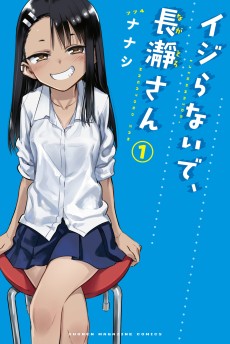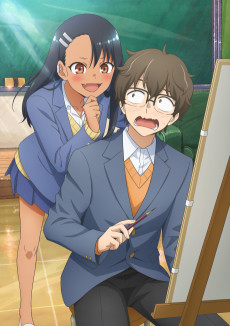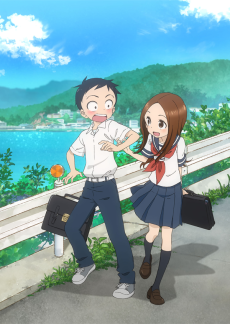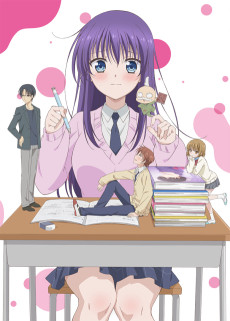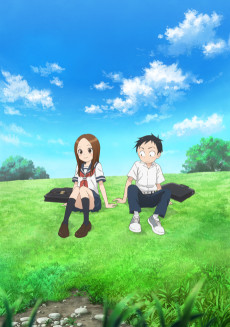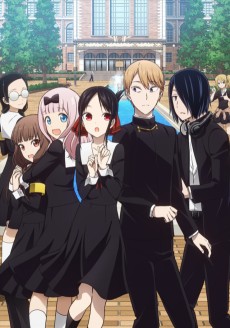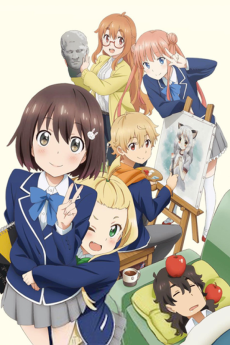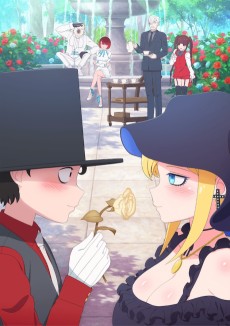IJIRANAIDE, NAGATORO-SAN
STATUS
COMPLETE
EPISODES
12
RELEASE
June 27, 2021
LENGTH
24 min
DESCRIPTION
"A girl in a lower grade just made me cry!"
One day, Senpai visits the library after school and becomes the target of a super sadistic junior! The name of the girl who teases, torments, and tantalizes Senpai is "Nagatoro!" She's annoying yet adorable. It's painful, but you still want to be by her side. This is a story about an extremely sadistic and temperamental girl and you'll feel something awaken inside of you.
(Source: Crunchyroll)
CAST

Hayase Nagatoro
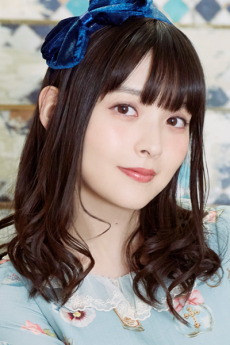
Sumire Uesaka
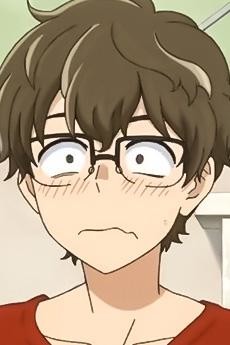
Naoto Hachiouji
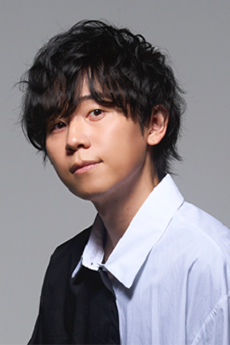
Daiki Yamashita
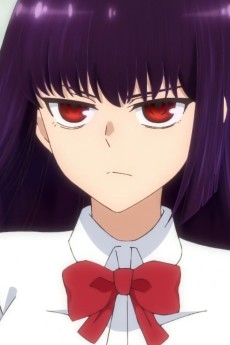
Sana Sunomiya

Nana Mizuki

Gamou
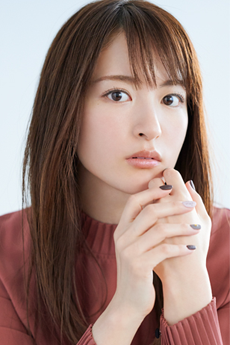
Mikako Komatsu
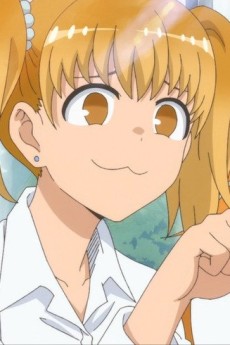
Yoshi
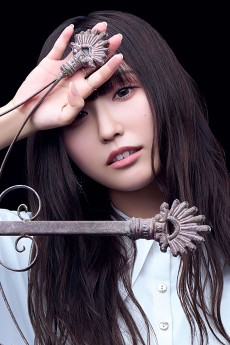
Aina Suzuki
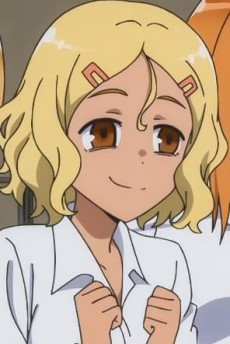
Sakura
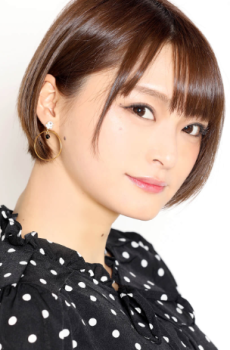
Shiori Izawa
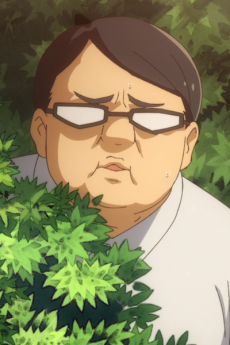
Otaku
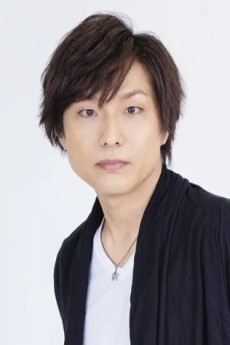
Junichi Yanagita
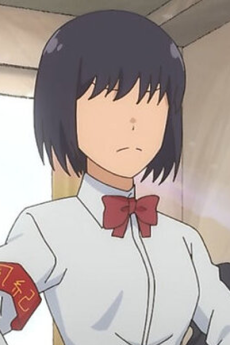
Fuuki Iinchou
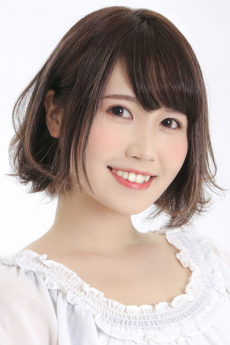
Hazuki Ogino
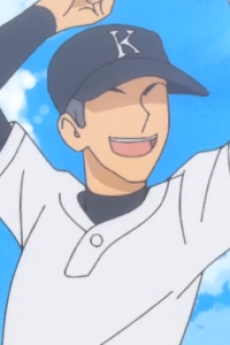
Hosokawa-kun
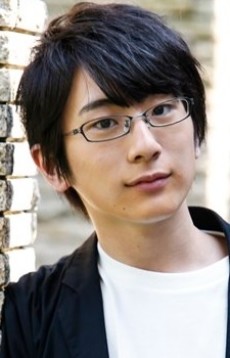
Yuuki Inoue

Seito 1

Arisa Sekine

Game no Koe
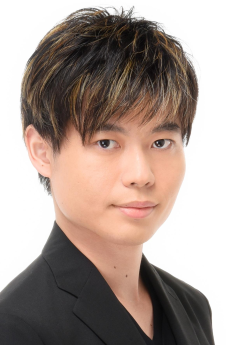
Kazumasa Fukagawa

Danshi
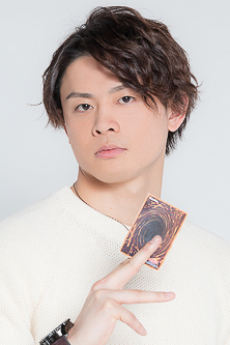
Shouya Ishige

Joshi
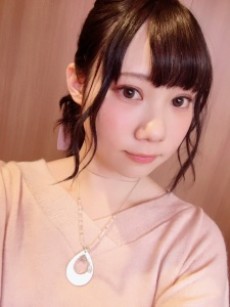
Momo Ishibashi

Dansei
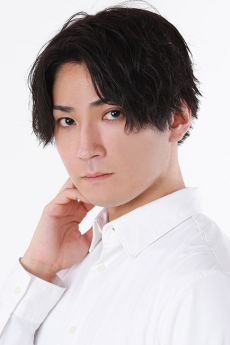
Taito Ban

Otoko Kenshi

Junichi Yanagita

Danshi

Katsuyuki Miura

Dansei
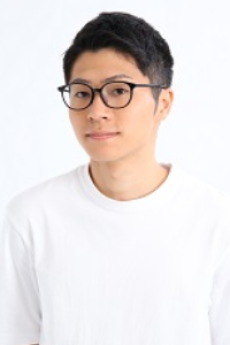
Takumi Motoi

Josei

Mai Murakami

Onna Kakutouka
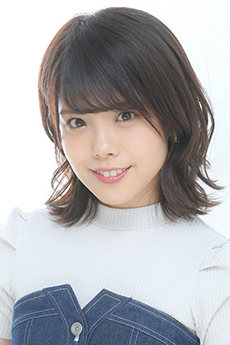
Risae Matsuda

Danshi
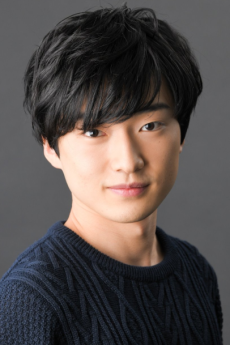
Rikuya Yasuda

Otoko Shujinkou
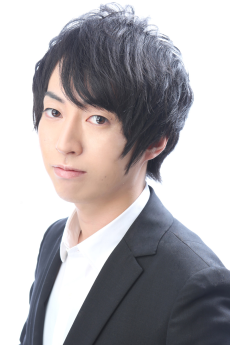
Shou Nogami

Joshi
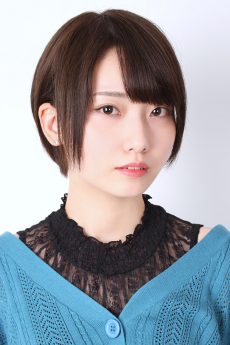
Yurina Amami

Danshi
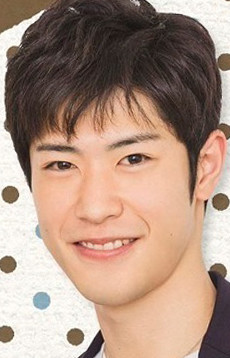
Takeo Ootsuka

Dansei
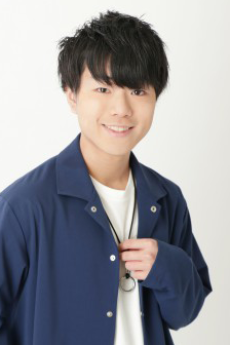
Takushi Fujikawa

Danshi
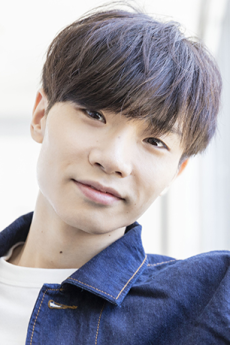
Yuu Miyazaki
EPISODES
Dubbed
RELATED TO IJIRANAIDE, NAGATORO-SAN
REVIEWS

AnimeDweeb
50/100Oh Nagatoro, You Tease.Continue on AniList#Rarely have I entered a show with as much trepidation as I had heading into *Nagatoro*. 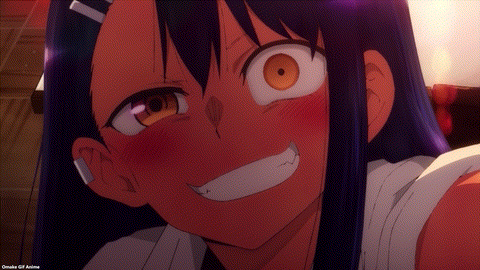
Watching the PV as an anime-only didn't pique my interest so much as confirm most of my fearful misgivings about the franchise. This IP is no stranger to controversy and vitriol, with outrage sparking left and right about anything from tan-lines to trauma. Generally there are two sides to conversations surrounding Nagatoro, and both are guilty of flinging around value judgements based on how others respond to the series. Ardent haters shame Nagatoro-stans for being masochistic simps who are OK with bullying. As for the fans, they accuse outsiders who don't "get" the series for being soft. On that note, I'd like to share what I gathered, with a third opinion that both ends of debate might end up bashing me for. Wish me luck, as we dive into a spoiler-free breakdown of Nagatoro. (Tl;Dr below)
#"Holy shit, they really went there." 
Consider yourself in like company if you were shocked at the way Nagatoro makes its entrance. Second-year Naoto, commonly referred to as "Senpai," is a soft-spoken member of the Art Club. A reclusive outcast, Senpai is very much the typical nerd, who dabbles in sketching to pass the time. One afternoon in the library, he accidentally spills the rough panels of a comic he was working on. This catches the eye of the enigmatic first-year Hayase Nagatoro, and she strikes up a spontaneous chat with our visibly-frazzled senior. What starts out as an innocuous conversation over Senpai's harmless drawings turns into a relentless exposé of his closeted fantasies. She goes as far as to enact a scene from this manga, in order to mock him for writing the main character as a self-insert harem-lord. This embarrassing altercation leaves Senpai in tears, and this only marks the beginning. Nagatoro frequently roasts and trolls Senpai for being a pervy otaku, shaming him for personal entertainment. In light of what's been mentioned so far, we should address how exactly the show chooses to frame all this harassment.
#"Bullying" is a bit of a misnomer for the franchise. 
Translations for this title often assume the worst connotation, deriving the erroneous label of "Please Don't Bully Me, Nagatoro." How Nagatoro behaves in this initial stage of the story certainly doesn't help paint the series in a good light either. It's easy to see why this bad reputation exists, as the general community constructs negative first impressions of Nagatoro's actions. But as early as the first episode, Nagatoro makes some effort to distinguish itself from bullying. It achieves this by flashing back to a childhood instance where Senpai actually was bullied. A standard bully highlights the differences between their cool self and the lame victim, so no connection is formed. On the other hand, Nagatoro is attempting to bridge the gap in her own way, even if those methods happen to involve openly mocking the MC. Senpai soon discovers that this isn't how Nagatoro treats just anyone. She plays neatly into the Sadodere archetype, by obfuscating affection for Senpai through humiliating him. Her face is frequently beet-red as she toys with his feelings and makes constant jokes at his expense. Because some connection is being made here, bullying doesn't exactly fit the bill. For the sake of argument, we should classify Nagatoro's behavior as "consensual harassment" and move onto another aspect which makes this relationship unique. Nagatoro represents an anomaly as she rebels against Japanese social norms. In typical Japanese high school culture, upperclassmen are often treated with a degree of respect by their juniors. It's certainly unique to see a show so comprehensively trashing those conventions with every sketch. Alongside the constant teasing involved, the show's repeated use of the informal term "Paisen" (a play on the honorific "Senpai") demonstrates how far the show is willing to take things. Amidst all the chaos, Nagatoro tries its hand at "gap-moe" between the meek Senpai and his mischievous Kouhai, thereby reinventing how that junior/senior relationship is usually portrayed in anime. In light of this local context, Nagatoro's treatment of Senpai kinda makes sense. So long as the show actually depicts a dysfunctional friendship, it should stand to reason that Nagatoro's actions are technically OK, and even allows the series to subvert story tropes.
#While clearing up this misconception makes *Nagatoro* more tolerable, that doesn't necessarily mean it's more enjoyable. 
I can acknowledge that Nagatoro takes the path less trodden, but that doesn't mean the road feels any less bumpy. Nagatoro and Senpai's relationship is as unique as it is nonsensical. The show's brazenness does little to convince audiences that its main pair actually became friends until well after the worst of his abuse. If someone mocks you to the point of tears upon your first encounter, chances are they're a scumbag that you should avoid associating with, let alone befriend. That line of thinking doesn't really change just because the victim has few friends, and still applies even if the prick is exclusively a prick towards that one unlucky individual. It's pretty basic social awareness that Senpai waves aside, like a lamb to slaughter. By the end of the pilot episode he claims that he "doesn’t mind" the antics of this minx; but that's a flat-out lie, given that his frightful meeting with Nagatoro left him in tears and kept him up all night. While Senpai lies about how he was treated like shit, Nagatoro is never held accountable for her bad behavior. This willful ignorance demonstrates how this series' sole focus is to establish the running joke of a Junior roasting the shit out of a Senior. There's no attempt at making this dysfunctional friendship one where Nagatoro's informal harassment is justified. Nagatoro's informal behavior isn't outright bad, if it develops from the two naturally opening themselves up to each other. Nagatoro winds up hitting us with all the emotional resonance of a one-night stand, by forcing its characters into an intermediate phase of a relationship for the sake of a quick, insensitive laugh. Their connection doesn't start out as something I'm invested in, but a mere setup for sitcom humor. This isn't a healthy basis for a relationship, this is an excuse for a comedic double act. It's a novel concept because it's neither been thought of before, nor adequately thought through. Even if we were to accept this pairing as a dynamic duo, there are barely any dynamics to be found. Senpai is such a pathetic pushover that he just sits there and takes whatever bait Nagatoro shoves in front of him. There's no chemistry in much of the series' sketches. It takes two hands to clap, but for much of the series it relies on a sole Noodle-toro arm to do all the work. With such narrow opportunities to work with, it's all up to our titular character to single-handedly carry the show on her slender frame.
#Let's have a heart-to-heart about [Nanashi's](https://anilist.co/staff/124304/Nanashi) writing. 
Unlike certain mobs on Twitter, I'm not one to disregard his whole body of work just because of his "problematic past" from his days as a lewd doujinshi author. Similarly, I can understand his position when publishing manga for Nagatoro. Before the Kodansha money started coming in, the franchise used to exist as a webcomic. This permutation of Nagatoro was far more explicit and unrelenting with its sadist tendencies. At some point Nanashi was asked to tone down the franchise into a story more accessible for wider audiences. As someone who had to rework some very nasty criticisms planned for Nanashi upon doing some research for this review, I can lend sympathy for an author who was motivated to change his original creative vision. Nanashi needed to prove that lightning could strike twice, innovating a winning formula by testing out new ideas. And that's precisely the issue to take with the Nagatoro anime. Too much of it feels like a testing ground; a work-in-progress rather than a polished piece. Nagatoro is an Alpha build, with a repetitive joke formula at its core. We've already discussed the more egregious instances of Nagatoro's teasing, which expose their non-friendship. But most of the other teases don't go as far; rather, they're formulaic punchlines that started to get stale by the second episode. Many of the jokes happen to be sex-related as well, and the sheer excess of mature content is compensated by Nanashi's apparent immaturity as a writer, as he taps into his rigid old ways in order to elicit chuckles ("Wow everyone, the hand soap Senpai applies looks an awful lot like semen! Please laugh! ") Every predominant female member in the cast acts like a trashy bimbo, talking about doing nudes and gesturing to their breasts. But I can't even afford to stay mad at Nanashi for being a One-Trick Pony, as attempts at diversifying from the lukewarm sex humor pans out pretty darn poorly. One promising sketch sees Senpai inexplicably awaken within a fantasy RPG, face off against strange creatures, and team up with a catgirl cheerleader who draws uncanny similarities with Nagatoro. Towards the end, the catgirl turns out to be the final boss the entire time, and Senpai is revealed to have woken up from his nightmarish nap. The entire sketch was one overly-long setup, which paid off the same way all the other teases did. The fact that new background and character assets were splashed on half an episode, only for the script to pull the cardinal screenwriting sin of an "It Was All A Dream" ending, honestly made me more infuriated than the excessive sexual content and harassment.
Here's the big takeaway for anyone on the fence about watching this show: if you're bothered by any of the content I've just mentioned, I recommend against giving Nagatoro a shot. Nagatoro does have merits outside of its masochistic tendencies and ecchi attempts at humor. However, I don't believe these positives are enough to warrant an experience that could outweigh the flaws, especially since these strengths are better found elsewhere. Skilled Teaser Takagi-san would be a great place to start, with its ominously mischievous tone replaced with a childhood atmosphere that feels vintage. Going off this sole season of anime alone, Nagatoro has a hard time setting itself apart from its problematic premise and recycled jokes. It's a damn miracle the show manages to stay afloat in the first place, and we'll be touching on that shortly.
#Somewhere along the way, *Nagatoro* figures itself out. Somewhere along the line, it addresses many of the criticisms pointed out in this review. Senpai grows a spine and starts feeling like a participant in Nagatoro's games. As for Nagatoro, her trolling persona gives way to a layer of vulnerability. This newfound complexity makes this pairing's friendship tangible. These friends finally feel more than a mere comedic duo, and the jokes also land harder on average. I found myself chuckling more often, since the gags gradually got more creative, despite the continued reliance on innuendo. Towards the last stretch, Nagatoro tries its hand at overarching plotlines, a flashback into Senpai's past, and some genuine attempts at wholesome drama. Heck, even one-note joke characters Yoshi and Maki get better lines of dialogue. Somewhere along the road, Nagatoro stops being a blueprint for a functional character comedy; it becomes that show. Of course, I'd be remiss to not mention the aspects Nagatoro got right since Day 1. Bearing the torch from last season's Horimiya, this series is brilliantly produced by SoL standards. The lighting is gorgeous, and the visual gags always do an excellent job of elevating Nagatoro's middling joke material. This adaptation also understood how to bring its tan titular first-year to life. As soon as I heard her voice in Nagatoro's PV, I knew damn well who this character was trying to be. Sumire Uesaka's line delivery is equal parts sinister and bashful, and sits alongside Kenjirou Tsuda's performance in Gokushufudou as two of the best voice castings in 2021. Nagatoro's facial reactions live up to the hype garnered from the manga, and are certainly worth shouting out. The strong last leg of Nagatoro's first season isn't enough to completely make up for the many pitfalls that came before it, but crossing that finish line certainly is worth celebrating.
#**Tl;Dr**: 
The show's use of emotional harassment acts as a disagreeable hook that gives way to formulaic sex jokes. To say that a majority of Nagatoro hinges on this one trick is an understatement. While disturbing for some, Nagatoro's behavior in the anime isn't exactly off-the-table. However, it's still hard to justify how this relationship makes sense, and provides a hurdle that the series struggles to properly address. The series eventually clicks for viewers who can see past this show's messy start. Perhaps Nagatoro's biggest tease is what's to come. 5/10~
#STRAY RAMBLINGS (**SPOILERS**:) -
Now that we're done, I'd like to offer an apology. With a show as controversial as Nagatoro, I did feel an obligation to rip off the Band-Aid from the get-go. There's a decent likelihood someone would be offended at what this series has to offer, and I'd much rather spare them a negative experience than put them at risk. I'm not trying to do a disservice to Nagatoro for Internet points or whatever. If anything, posting my opinions as a public resource makes me more willing to err on the side of caution with this discourse.
-
Speaking of discourse, can someone explain to me what the hell happened with the debate over Nagatoro's skin color? Really don't know what the big deal was.
-
Shoutout to whoever came up with the show's visual references. Seemed like Nagatoro had everything, from Jojo to The Garden of Words.
-
Nanashi before Nagatoro :

- BEST GIRL: N/A. Maybe next season.

Thanks for making it this far, let me know if I deserve any "Points for Improvement." If you happen to like my verbose rants, feel free to check out my other reviews for seasons past and present. I also frequently post writeups under my list updates, so definitely take a peek if you'd like to see me mald over anime as they hit the airwaves. Peace~
-

AlexiSan2003
75/100Senpaii, eu sou sua Kouhai vc é minha presa.Continue on AniListUm dos animes que mais divertir nessa Temporada, um anime bem diferente do tradicional msm com alguns clichês, Mas entendo que pode incomodar várias pessoas pelas piadas e pelo tema.
"Todo o desejo incômodo e inquieto se dissolve no amor da verdadeira filosofia." Nanashi o Criador da Obra mudou muito a sua perspectiva artística por causa de Nagatoro, antes era muito mais explicíto e bem forte, mas conseguiu expandir a sua mente criativa e reduzir um pouco da polêmica gerada pelo fetichismo do autor.

A obra Nagatoro acompanha a Vida do Senpai, e sua Kouhai Nagatoro que faz Bullying, mais após esse encontro estranho, eles começam se aproximar e acompanhamos no show o cotidiano desses dois.
Eu entendo, quem se incomodou muito e até dropou a obra pela sua abordagem incomum, que inevitavelmente pode incomodar e até mexer desagradavelmente com as pessoas.Particularmente eu gosto de Nagatoro, por sair do padrão geral do gênero Slice of life e dos Romcoms, msm que apresente piadas repetitivas e sempre levar para o lado erótico. Eu não pensava que iria me divertir e me prender tanto no anime e mangá

Mas a coisa que mais chama atenção é a desconstrução da imagem do bullying e virando um romance com os dois personagens começando e gostando um do outro um desenvolvimento diferente e peculiar de um casal.
A animação tem closes de cenas muito bons principalmente quando a Nagatoro está em cena, a composição é legal e consegue ser competente com a câmera para auxiliar na produção, exclusivamente nos momentos de comédia que puxa para um lado mais cartunesco.

Como um leitor do mangá, extremamente satisfeito com a adaptação, acrescentou muito mais nas cenas e manteve fielmente, oq estava no mangá.

É engraçado saber que eu gosto dessa obra, pq achei a proposta antes estranha, mas a após conhece-la melhor me fez gosta e rir muito, me fez perceber outras perspectivas com outras pessoas, que podemos ajuda-la a sair da sua zona de conforto e conseguir transforma-la em uma pessoa melhor do nosso jeito.

Conclusão:
Nagatoro é uma faca de dois gumes que você pode gosta ou odiar, depende da sua experiência com o tema do anime e com as piadas enrustidas e repetitivas, mas me entreteu muito até o final, ansioso para mais uma temporada. Hihi

AlucardNoYuuutsu
60/100"Ijiranaide, Nagatoro-san" succeeds in what it's trying to do and that's why I think it's worthwhile.Continue on AniList(I don't read the manga so I don't care about comparisons)
I started watching "Ijiranaide, Nagatoro-san" out of pure boredom and curiosity. I was randomly browsing on the internet, saw this was being released and I said to myself "why not?" and I gave it a shot. And to be honest, the outcome isn't bad.
"Ijiranaide, Nagatoro-san" talks about Naoto, a typical shy and isolated schooler that's bullied and made fun of constantly. But one day- he meets a fancy girl, called Nagatoro... and seeing that he's being made fun of by her friends too... she feels pity and decides to--- make fun of him.
Naoto is initially really annoyed by her, but as days go by he starts to realise that these are teasings of a different kind, they aren't straight out disrespectful. And since this isn't a trivial relationship, both will become more mature and learn more about themselves.The humour this anime offers consists of:
- "hahaha wee woo senpai you virgin haahaha woo woo"
- "hahaaaa you pervvv you weirdoooo what a creep haahaaaaaa"
- something awkward happens - "oh darnnnnn senpai you ABSOLUTE creep"
It sounds pretty trite- and it kind of is, but "Ijiranaide, Nagatoro-san" still proves to be an enjoyable watch through its awkwardness. It's that type of embarassment that makes you say "Oh God, this is so embarassing I have to stop this episode for some seconds, I don't even want to continue it". For example, when I used to watch Doraemon on TV when I was a kid and the unavoidable Shizuka bath scene would appear. I would feel exactly like that: "it's so dumb and awkward, give me a break, but it's funny".
Of course, this heavily depends on what you personally think it's funny. As for me, I appreciate it because it's straight-forward, it doesn't overwhelm the viewer with overthought jokes and gags, it just does its thing and manages to do it well.
Also, another thing I appreciate is the fact that this anime doesn't have the "too serious moments" some other comedy series have. It's just comedic, and while doing that, it's still able to make the viewer grow fond of the characters.
The art style is pretty good. It's nothing revolutionary, but it works and that's all that's necessary in my opinion. As for the sound, this is a comedy anime, so it doesn't have an emotional and memorable OST, but it doesn't need to.
All in all, I don't quite regret watching Nagatoro-san, it's not the masterpiece that will change your life, but not every anime needs to be impactful and resonate with feelings. "Ijiranaide, Nagatoro-san" succeeds in what it's trying to do and that's why I think it's worthwhile.
Greater than 2100 letters? Well- why should I be forced to write more than needed? Simple words for a simple show.
SIMILAR ANIMES YOU MAY LIKE
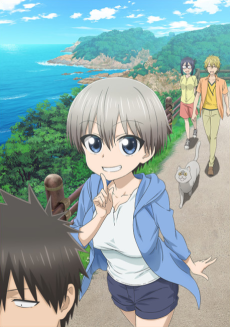 ANIME ComedyUzaki-chan wa Asobitai!
ANIME ComedyUzaki-chan wa Asobitai!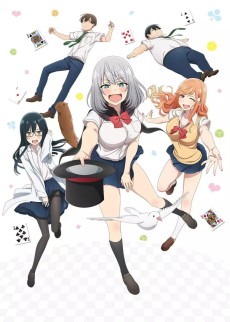 TV SHORT ComedyTejina Senpai
TV SHORT ComedyTejina Senpai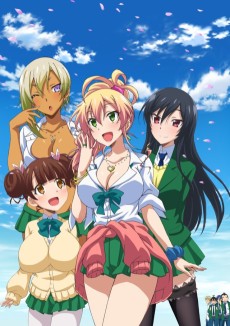 ANIME ComedyHajimete no Gal
ANIME ComedyHajimete no Gal
SCORE
- (3.5/5)
TRAILER
MORE INFO
Ended inJune 27, 2021
Main Studio Telecom Animation Film
Trending Level 4
Favorited by 4,299 Users
Hashtag #長瀞さん #NAGATORO

